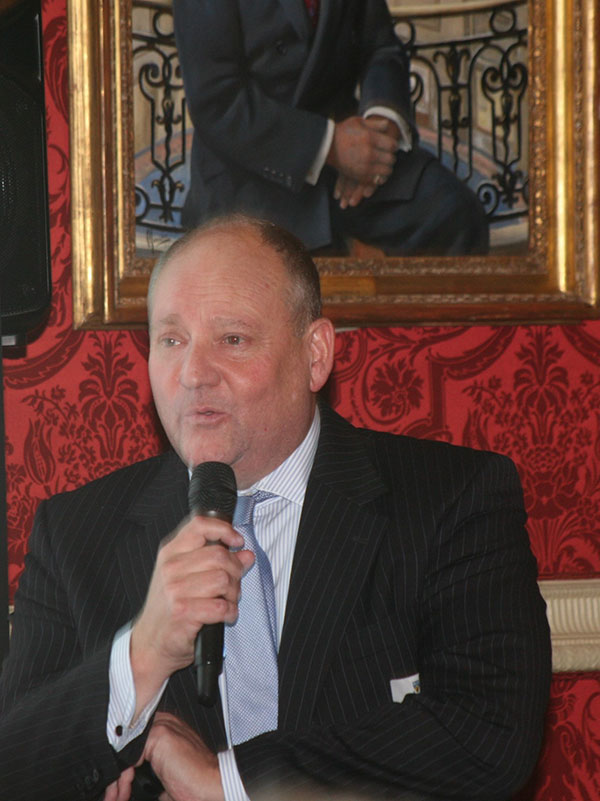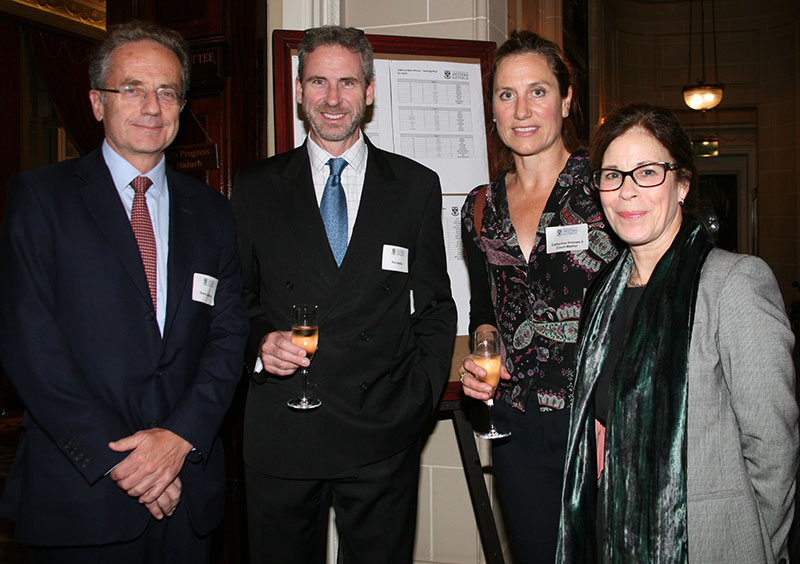
Guest Speaker Prof Russell Foster
The 2019 UWA London Dinner speaker was Professor Russell Foster CBE FRS FMedSci, founder and Director of the Sleep and Circadian Neuroscience Institute and Head of Oxford’s Nuffield Laboratory of Ophthalmology. His research led to the discovery of a novel light-sensing cell population in the eye, which revolutionised the field of chronobiology and has the potential to form the basis of new treatments for sleep and circadian rhythm disruption.
Introducing Professor Russell Foster was Professor Peter Eastwood, president of the Australasian Sleep Association and director of UWA’s Centre for Sleep Science. As the master of ceremonies, Professor Eastwood noted that in the UK the cost of inadequate sleep, with its adverse impact on productivity and health, was estimated to be £40 billion ($A75 billion) a year. Following the recent parliamentary inquiry into sleep health, Australia joined the UK in being one of the few countries in the world with sleep as a priority on the national agenda.
Professor Foster’s address focused on how the biology of circadian rhythms could inform new sleep therapeutics. Circadian rhythms referred to biological events that recur on a 24-hour cycle. In humans, these rhythms had developed as an evolutionary response to the day/night cycle, where food availability, predation risk, and environments are drastically different during the night and day. Using the example of hormone secretion, Professor Foster demonstrated how circadian rhythms dictated human physiology and behaviour, and how they were geared “to doing the right thing, in the right order, at the right time of day”.
Until recently, the benefits of taking circadian rhythms into account in medical practice had not been fully understood. For example, children with leukemia who received chemotherapy in the morning were found to be 2.5 times more likely to relapse compared to those treated in the evening. Whilst, vaccinating in the morning was nearly twice as effective as vaccinating in the afternoon.
Furthermore, Professor Foster stressed that circadian rhythm disruption remains highly prevalent in modern society. Poor or insufficient sleep wrecks rhythms and is far more detrimental than just feeling tired. A sleep-deprived brain has reduced cognition and decreased creativity. As a result, there is an increased risk of developing mental illness from associated physiological and psychosocial stress. Indeed, the May 2019 Pilbara Sleep Health Summit had highlighted these phenomena in fly-in-fly-out workers in the Australian resources sector, which in some cases had led to suicide and severe mental health problems.
Professor Foster’s research has revealed how blue light acts to entrain circadian rhythms. Today, researchers can use this knowledge of how light and sleep regulate the molecular clockwork to correct circadian rhythm disruption. Sleep scientists at UWA and Oxford are well-positioned to translate basic research into education for shift workers, managers, and families. However, contingency plans will be needed in cases where sleep education might fail, or where implementing changes in practice or lifestyle are not practical. On this topic, Professor Foster spoke about the tantalising notion of developing a pharmacological intervention with an effect equivalent to light, which could be used to manage circadian rhythms and sleep. Current trials were promising – the drug being tested had measurable effects similar to light treatment.
In closing, Professor Foster reinforced the point that curiosity-driven research was fundamental to the breakthrough discovery of a new light-sensing mechanism, which had redefined our understanding of the eye and of circadian biology.

Dinner Sponsor and Friends Fellow Simon Johnston, Rob Mather, Wine Sponsor and Friends Trustee Catherine Holmes à Court-Mather, UWA Vice-Chancellor Prof Dawn Freshwater
UWA Vice-Chancellor Professor Dawn Freshwater joined Friends in hosting the Dinner for the last time before her departure to take up her new post in New Zealand. She updated alumni and friends on the progress UWA had made in adopting the 2030 vision she had worked so energetically to create. It involved a number of grand challenges relevant to UWA’s location on the Indian Ocean rim and harnessed the power of the University’s research-led capabilities.
The Dinner was attended by 70 guests comprising UWA’s valued UK friends and collaborators and senior alumni. We were pleased to welcome Lord Jones of Birmingham, an Adjunct Professor at UWA; Professor Koen Lamberts, Sheffield University Vice-Chancellor; Professor Chas Bountra, DVC Innovation at Oxford University; and Dr Ian Henderson, Director of Menzies Institute Australia.
Joining us to support the sleep science focus of the event were leading health safety and human performance practitioners: Dr David Flower, BP’s Senior Health Director from London; and Dr Angela Baker, Shell’s Global Fatigue Subject Matter Expert from The Hague.
Led by Professor Eastwood a contingent of UWA sleep scientists attended the Dinner: Professor Romola Bucks, Head of the UWA School of Psychological Science; Professor David Hillman, emeritus Sleep Medicine consultant at Sir Charles Gairdner Hospital; Dr Jennifer Walsh, Lecturer at the UWA Centre for Sleep Science; and Grace Goh, Forrest Fellow and PhD candidate in circadian science.
The Dinner was generously sponsored for the first time by Simon Johnston, a former Friends Trustee and now Fellow, and his wife Caroline, taking over from Dick Porter and Tina Jensen who were sponsors from 2014 to 2018. Catherine Holmes à Court-Mather continued as wine sponsor providing wonderful Vasse Felix wine for the occasion.